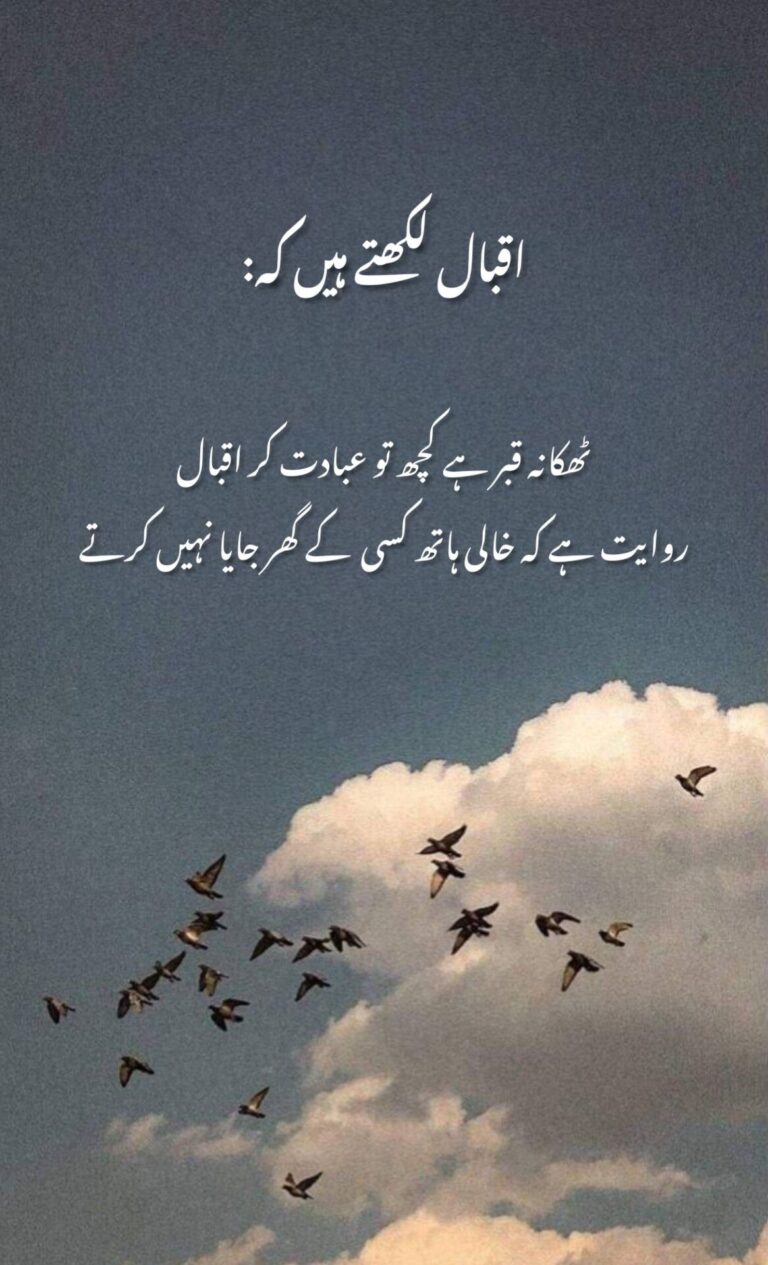
URDU QUOTES ABOUT LIF
- The Urdu couplet reads:
> Iqbal writes:
> “Our final resting place is the grave, so do some worship.”
> “Tradition says that one does not go empty-handed to anyone’s house.”
>
This couplet by the renowned poet Iqbal carries a profound message about the importance of leading a meaningful life and preparing for the hereafter. It emphasizes the need to engage in acts of worship and good deeds, as these are the provisions we carry with us to the grave.
- The first line, “Our final resting place is the grave, so do some worship,” serves as a stark reminder of our mortality. It implies that our earthly existence is temporary and that our ultimate destination is the grave. The couplet urges us to make the most of our time on Earth by engaging in acts of worship and seeking spiritual growth. This is not merely a religious obligation, but a way to enrich our lives and ensure a meaningful afterlife.
The second line, “Tradition says that one does not go empty-handed to anyone’s house,” draws a parallel between the grave and a host’s house. It suggests that just as we would not go empty-handed to a friend’s or relative’s house, we should not go to the grave without bringing something of value. This “something” is not material wealth or possessions, but rather the good deeds and spiritual merits we have accumulated throughout our lives.
The couplet highlights the importance of leading a balanced life, one that combines both worldly pursuits and spiritual endeavors. It encourages us to strive for excellence in all aspects of our lives, whether it be our work, our relationships, or our worship. By doing so, we can ensure that we leave a positive impact on the world and secure a place in the hereafter.
In essence, Iqbal’s couplet is a call to action. It urges us to live our lives with purpose and meaning, to strive for spiritual growth, and to prepare for the inevitable. By doing so, we can face the future with confidence and hope, knowing that we have made the most of our time on Earth.
This couplet resonates deeply with me because it reminds me of the importance of living a meaningful life. It has inspired me to be more mindful of my actions and to strive for spiritual growth. I believe that by following the teachings of Iqbal, we can create a better world for ourselves and for future generations.
Here are some additional points to consider:
* The couplet can be interpreted in various ways, depending on one’s personal beliefs and experiences.
* It is important to remember that the grave is not the end, but rather a transition to the next stage of our existence.
* The couplet encourages us to live a life of balance and moderation.
* It is a reminder that our actions have consequences, both in this life and the next.
I hope this description is helpful. Please let me know if you have any
other questions.
A Deeper Dive into Iqbal’s Profound Verse
The Weight of Mortality and the Call to Action
Iqbal’s couplet, a poignant reflection on life’s transience and the importance of spiritual cultivation, invites us to contemplate the profound meaning of existence. The first line, “Our final resting place is the grave, so do some worship,” is a stark reminder of our mortality. It implies that our earthly journey is fleeting, a mere blink in the cosmic expanse. This realization, far from being a cause for despair, should instead ignite a sense of urgency within us to make the most of our limited time.
The poet urges us to engage in acts of worship and spiritual devotion. This does not necessarily refer to rigid religious rituals or dogmatic beliefs. Rather, it encompasses a broader spectrum of practices that nurture our souls and connect us to something greater than ourselves. It could be meditation, prayer, acts of charity, or simply spending time in nature. By immersing ourselves in these practices, we can transcend the limitations of our physical bodies and tap into the infinite potential of our spirits.
The second line, “Tradition says that one does not go empty-handed to anyone’s house,” introduces a powerful metaphor. It suggests that the grave is not merely a final resting place, but a destination where we are expected to present ourselves with honor and dignity. The “provisions” we carry with us are not material possessions or worldly achievements, but the spiritual wealth we have accumulated through a life of virtue and righteousness.
This couplet invites us to examine the nature of our actions and intentions. Are we merely going through the motions of life, or are we actively striving to make a positive impact on the world? Are we prioritizing material gain over spiritual growth? The poet encourages us to shift our focus and invest our time and energy in cultivating our souls.
A Timeless Message for Modern Times
Iqbal’s message is as relevant today as it was centuries ago. In our fast-paced, materialistic world, it is easy to lose sight of the true meaning of life. We often become preoccupied with superficial pursuits and neglect the cultivation of our inner selves. Iqbal’s couplet serves as a wake-up call, urging us to reassess our priorities and embrace a more meaningful existence.
By embracing the teachings of Iqbal, we can transform our lives and the world around us. We can cultivate compassion, empathy, and understanding, and work towards creating a more just and equitable society. By living a life of purpose and meaning, we can honor the gift of life and leave a lasting legacy.
In conclusion, Iqbal’s couplet is a timeless masterpiece that continues to inspire and uplift generations. It reminds us of the fragility of human life and the importance of living a virtuous and meaningful existence. By heeding the poet’s words, we can embark on a journey of self-discovery .


 MOTIVATIONAL QUOTE FOR WORK
MOTIVATIONAL QUOTE FOR WORK





